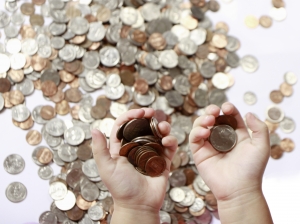There are two main sides of this:
- create distance between you and poor choices
- make the right choices easier/more accessible
Thinking about those two options may give you your own ideas of what you need. (And here are my examples.)
I create my distance by closing doors.
It wasn’t till my first serious effort to lose weight (summer of ’09) that I realized I have a very poor record when it comes to shutting things. Cupboard doors, chip bags, cracker boxes. And I made the corresponding observation that the easier it was to graze (take a bite here or there), the more I did it.
There were two ways I dealt with this back when I was a 30 and a normal American with Doritos on my shelves.
- Closing things as soon as I was done with them (made it harder to lie to myself about it being “nothing.” You don’t open a bag for “nothing.”)
- Pre-portioning a single serving for the week of anything I liked to graze, and taking it out of my HEP allotment before I even started the week
- This way my “just one chip” a couple times a day was always legit.
- And this may genuinely matter less to a taller person, but at a bit under 5’4″ I find precision is better than the opposite
Now that my HEP doesn’t allow for gluten-containing things like Doritos, I’ve learned that grazing is not a compulsion. I genuinely have no problem walking by the open bag of pretzels (Just don’t wave it. Please.). And the cool thing about learning this is how it can make saying no to other things seem more in reach.
That said, when simply feeling good about making good decisions ceases to be motivating I’ve still found the best thing I can do to reenforce my good intentions is to close doors.
Get things out of sight.
I made tater-tots for my kids. Trying to get a few of those “fun mom” points. Then the taters sat out to cool. And there were left-overs. And I ate a few, even though I don’t actually like potatoes that much.
They were out, crunchy, grabbable and I was reminded: Get it put away.
I refuse to label mis-eating as Sin. Some Christians do label. I think it’s one of the gray areas covered by grace and up to the individual’s conscience.
That said, I still think the Biblical admonition applies. We are told to flee temptation.
I don’t think this means running out of the kitchen (necessarily), but I think it firmly presses home the fact that we aren’t required to keep things hard for ourselves, just to prove how tough we are.
Managing your environment means make it easy for yourself.
Especially if you’re the mom, you’re probably choosing what foods come into the house in the first place.
This is no kind of contest where the person who holds out the longest gets a free desert.
Allow your self-discipline training wheels at home.
This is a long ride. Try not to wear yourself out just as you’re getting started.









